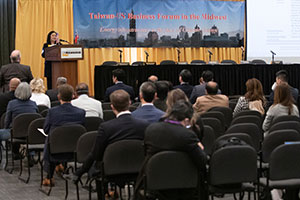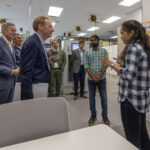Energy infrastructure problems in the face of climate change pose challenges both in the United States and abroad. The search for solutions also creates opportunities for collaboration between higher education institutions, government entities and private companies to advance research and address workforce needs.
UWM, in partnership with the Taipei Economic and Cultural Office in Chicago, hosted the Taiwan-U.S. Business Forum in the Midwest on Monday to discuss these issues and others related to energy infrastructure and climate change.

Panelists at the event in the UWM Student Union ballroom included legislators from Wisconsin and Illinois, policymakers, industry leaders and academic researchers.
The forum provided a venue to discuss potential solutions to challenges in areas like energy production, distribution, usage and storage in light of climate change.
The conversations are “very timely given that Taiwan and the U.S. have declared very ambitious plans to reduce emissions,” said Johnson Chiang, director general of the Taipei Economic and Cultural Office of Chicago.
Chiang noted that Taiwan is targeting 2030 as a goal to switch all government vehicles and urban buses to electric. President Biden also is aiming for 2030, with a plan for electric vehicles to make up half of all vehicles sold in the U.S. by then.
“It means we need a lot of energy infrastructure, not only with charging stations, but also with the ecosystem of EV-related businesses,” Chiang said.
Speakers at the forum included leaders of Taiwanese companies based in the Midwest. Panelists also discussed the role of higher education in addressing workforce needs and advancing innovation.
UWM Chancellor Mark Mone highlighted in opening remarks the university’s focus on partnerships and how they help encourage collaboration and open pathways to research and learning opportunities for students, faculty and staff. For instance, WE Energies is a sustaining member of one such partnership, the Connected Systems Institute.
The event ended with networking opportunities over lunch for attendees, which included students.
“This is about looking toward the future, and in particular, energy and infrastructure issues,” Mone said. “What do we want our future to look like and how we get there — this is what today is about.”
The event was also sponsored by the Taiwanese American Chamber of Commerce of Greater Chicago and Metropolitan Milwaukee Area Chamber of Commerce.






